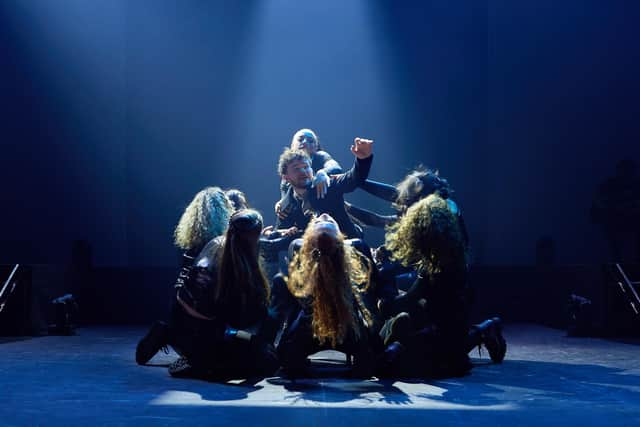Theatre review: Burns, Edinburgh Playhouse
Burns, Edinburgh Playhouse **
Somewhere at the heart of Trish Tindall’s musical Burns – which premiered at the Playhouse over the weekend after 30 years of development, and some Fringe success in an earlier version – there is a strong idea that will not let Tindall rest.
It’s an idea – or so it seems – about some kind of dialogue between a 21st century woman, and the 18th century poet whose poetry and life inspires and obsesses her; and to judge by Tindall’s impressive Playhouse performance as pianist, singer, conductor and narrator, she could have created this piece as a powerful solo oratorio, or as a play with songs for two performers, a true conversation across the centuries between her music and his poetry.


Advertisement
Hide AdInstead, though, the show has fallen victim to the quest for a large-scale Scottish musical; and the result is the strange, remarkable and sometimes bewildering event that took to the Playhouse stage this weekend, featuring a cast of 15 drawn mainly from the young students of Tindall’s Entertainment Academy in Lossiemouth. The idea of this version is to imagine how it would be if Burns were alive today, in the age of mobile phones, online influencers, instant fame and instant shame; but amid the cacophony of Tindall’s hellish vision of 21st century fame – a nightmare of addiction, self-indulgence, loud swearing, blaring music and blinding lighting effects – the poetry that gave Burns’s short life meaning, and at which he laboured to the point of exhaustion, is almost entirely lost. It’s a narrative that often leaves Elijah Aspinall’s Burns (the only male figure in the cast) with little to do but squirm and sulk around the stage like an upset toddler; while the women in his life – including a chorus of lovers with formidably big hair – circle around alternately adoring him, and exhorting him to grow up.
Add an apparent determination to give the show a transatlantic twist (Burns’s publicist Meg is a stage American in super-tight blue jeans and a cowgirl hat), and the story careers towards its climax in a truly agonising Hollywood stadium rap version of Tam O’Shanter, in which it is literally impossible to hear a single word of the poem; while the chorus, in baggy blue suits, loup around thrashing their hair so extravagantly that I began to wonder whether they were being sponsored by a leading shampoo manufacturer – presumably because we, or Scotland, or Burns, or something, are worth it.
Seriously, this scene seems to be conceived as a 21st century version of Tam O’Shanter’s ill-fated visit to the witches’ dance at Alloway Kirk; and there are a few moments when the beauty and power of Burns’s writing succeeds in breaking through, including an exquisite solo performance by Elizabeth McNally of the romantic farewell Ae Fond Kiss (badly misplaced, though, at the death of Burns’s father), and brief references to A Man’s A Man For All That and Auld Lang Syne. Some of Tindall’s original songs have a true power and passion of their own; and her eight-piece onstage band do themselves proud in all the musical genres this complex show demands, while the young cast show impressive commitment and dedication.
In the end, though – in a world where Burns’s poems are not well known to most people – this show, like too many stage representations of Burns, sells the man short by not trusting and foregrounding his words, and the passion for beauty, truth, humanity and justice that shaped them. Instead, we have something like Amadeus without Mozart’s music – the vision of an obscene child noising up the society around him, then and now; while the art that made him matter is sidelined, in the rush to connect him with a 21st century celebrity culture mainly focussed on those who – unlike Robert Burns – are often famous for nothing at all, except for being famous.
Run ended